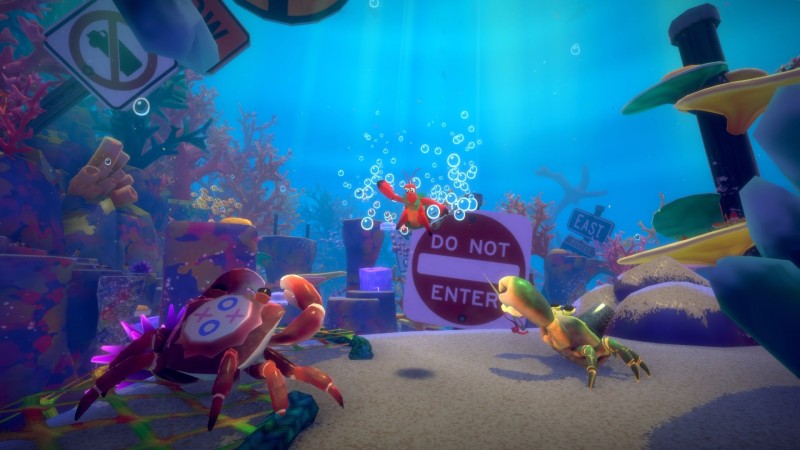Another Crab’s Treasure, as the name suggests, is a humorous and pun-filled world where the sea is your Soulslike oyster. A fork acts as your defacto sword, while various other remnants from above, like shot glasses, soda cans, and more, serve as your shield. With fork in hand and can on back, Kril, a shy but easygoing hermit crab, sets out into the aquatic kingdom to find his favorite shell, stolen from him by a loan shark tax collector. What follows is an adventure that excels at being an amusing and bright reprieve from the otherwise dark and terror-filled Soulslike genre. However, the action doesn’t hit the same highs; while unique and expansive in some ways, it feels too floaty, too imprecise, and too annoying too often, polluting an otherwise fun 15-hour jaunt through a trash-filled ocean.
Developer Aggro Crab smartly leans into the game’s premise, and the results often had me chuckling. Whether it was in-world jokes, pokes at real-world and human-made problems with the ocean, or simple wordplay (words like shuck, carp, cod, and more replace similar-sounding real-world curse words), I was constantly smiling while interacting with the various creatures of the ocean. Solid voice acting and design also make each NPC and boss a treat.
This lean into the premise extends to the game’s action, too, but it’s less successful. To Aggro Crab’s credit, the combat progresses meaningfully with distinct, eccentric mechanics and abilities. Instead of a standard weapon-based parry, you must hide in your shell and pop out of it right before an enemy strikes to parry properly; defeating a large crustacean boss grants you a special hammer claw-like ability for large sweeping strikes; “Umami” magic within each shell manifests in interesting ways, like a shot glass that splits into shards when attacked, a bowling ball-like roll within a tennis ball shell, or homing carbonation bubbles that shoot out of a soda can.
Most of my joy in combat came from seeing the “new” – the special Umami magic in a new shell, the new ability gained after defeating a major boss, or the new stowaway attachment that increases my vitality or defense, for example. There’s no shortage of quirkiness in the combat, and there’s a respectable amount of departure that works from what I typically expect in a Soulslike.
That’s why it’s a shame the foundation of the combat is so shaky. It’s floaty, likely on purpose, considering Kril’s adventure largely takes place underwater, but the tradeoff for that feel is impreciseness that doesn’t work with such challenging gameplay. The camera is finicky, too, leaving me to fight various enemies at once who cornered me against a wall giving me no real view of what’s happening. Critically, when I died in combat, it usually felt less like something I could personally improve on – an important aspect of the genre – and more like the game had cheated me into death.
All of this is exacerbated by a story that starts strong before meandering into a rushed finale, with my least favorite area and a slew of bosses that each felt like they could have been the final in the game. It doesn’t help that various game crashes and bugs in the final hours slowed my progression forward here.
Though the combat, which falls between serviceable and irritating, threatened my enjoyment, I still found delight in the currents of Another Crab’s Treasure. Kril’s reluctance to become a hero and his subsequent journey, messaging surrounding the dangers corporations pose to our oceans, and clever twists on the Soulslike formula deliver a satisfying, albeit uneven and flawed, wade through uncharted waters.
